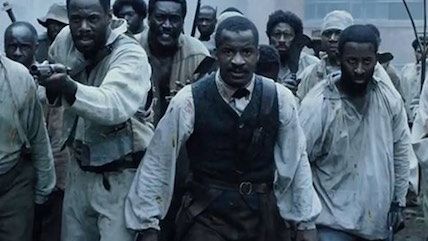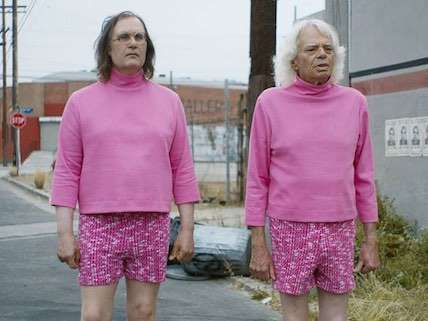Movie Reviews: The Birth of a Nation and The Greasy Strangler
Slavery days revisited and a really bad bad movie.


Can there be too many movies about black slavery in America? Not as long as there are new generations to be instructed in its abominable particulars, most likely, and not as long as its corrosive legacy continues to fester. The Birth of a Nation, the new movie by actor, writer and first-time director Nate Parker, takes up the subject once again, with mixed results. In recounting the story of Nat Turner, leader of a celebrated slave rebellion in 1831 Virginia, Parker gives us most of the familiar horrors: the whippings, the lynchings, the casual rapes. But he also devises fresh images: the sight of two plantation children at play, with a little white girl happily leading a little black girl around by a noose fastened to her neck, says as much about the soul-crushing inhumanity of black bondage as the movie's more gruesome scenes.
Unfortunately, in his determination to avoid turning the film into an exercise in pure rage, Parker has extended his story into areas of melodrama that recall the sentimental historical epics of Hollywood's golden age. We see the young Nat, tutored by a kindly white woman, engrossed in reading a Bible by the hearth light in his family's rough cabin. (Other books, his mentor tells him, "are full of things your folk wouldn't understand.") And while Parker's depiction of the love between Turner (played by Parker himself) and a battered slave girl called Cherry (a luminous Aja Naomi King) has a sweet delicacy, it also flirts with cliché, and it slows the movie's momentum.
Parker lays out the necessarily presumptive details of Turner's life at a languid pace. As a boy, Nat is told by a slave shaman that "you're a child of God. You got a purpose." We see his childhood friendship with plantation scion Samuel Turner (played as a grownup by Armie Hammer) slowly devolve into the master-slave relationship decreed by their culture. When not laboring in the cotton fields, Nat begins preaching the gospel to his fellow slaves. This draws the attention of a scheming white minister (Mark Boone Jr.), who wants to use Nat's evangelical charisma to convince potentially rebellious slaves to accept their miserable lot in life. Nat goes along with this at first, quoting Biblical justifications of slavery. But his obedience is withered by the terrible things he sees on his travels among the local plantations. (One desperate slave, embarked on a hunger strike, has his teeth knocked out by a hammer and chisel to facilitate forced feeding.) Soon Nat is declaiming the Good Book's numerous condemnations of the "peculiar institution," and asking the Lord to "be an enemy to our enemies."
The story naturally culminates in Turner's famous revolt, in which he leads dozens of slaves bearing knives and hatchets in a spasm of retribution that ends with the deaths of dozens of white men, women and children. (Parker doesn't shy away from showing us this rampage.) In the end, with the rebellion crushed, Turner calmly submits to a hideous fate.
Parker, possibly distracted by the challenges of directing the movie, is a little too mild in his portrayal of Turner—he's not entirely convincing as an obsessive revolutionary. He also makes some awkward pictorial choices (like the shot in which Turner holds an ear of corn in his hand, watching as it begins to ooze blood). And the scene in which we see a long line of black corpses hanging from trees is undermined by the decision to accompany this haunting image with Nina Simone's rendition of "Strange Fruit"—a slightly jarring anachronism.
But the movie is filled with fine black actors, and you can't help wondering how many of their careers will be limited to race-centric movies like this one in the future. Will slavery narratives ever reach the point of diminishing returns? In a video posted to Instagram last May, Snoop Dogg, railing against a remake of the slave narrative Roots, expressed an angry concern on this subject. "They going to just keep beating that shit into our heads about how they did us…?" he said. "Fuck that old shit."

The Greasy Strangler
The Greasy Strangler is a would-be midnight movie that's been drawing chortles of astonishment on the festival circuit all year long. Now it's coming to a theater nowhere near you. The film is a demonstration of the fact that a true midnight movie must be more than just bad. The works of Ed Wood and Tommy Wiseau, titans of cinéma mauvais, may be awash in technical insufficiency, but their nitwit passion is oddly winning. Strangler is something else. It's a hipster calculation that attempts to sell moronic incoherence as ironic artistry. It fails at this—resoundingly—because, among other things, it's just too boring.
The story is a feeble hodge-podge. A father and son named Big Ronnie (Michael St. Michaels) and Big Brayden (Sky Elobar) eke out a living giving guided "disco tours" of Los Angeles (or at least those drab precincts of the city where a movie like this can be shot with little objection). Ronnie is a tall, bony egomaniac; Brayden a droopy tub of a man. Ronnie has ridiculously over-styled shoulder-length hair, and both men wear pink shorts and tops out on the street. Their tours are a dubious enterprise (one shrine on their list is a store where "Kool of Kool & the Gang" once worked), but they're modestly successful. When a roly-poly woman named Janet (Elizabeth De Razzo) shows up for the excursion one day, Brayden is instantly attracted to her, much to Ronnie's annoyance (he fears a disruption in "the family business").
In the house that they share, Brayden spends a lot of time cooking Ronnie's favorite food, all of it greasy—although the sausages and bacon rolls he turns out are never greasy enough, and always require additional latherings of fatty goo. "Why don't you put a little grease in your coffee?" Ronnie suggests.
In his off-hours, Ronnie roams the city as the Greasy Strangler, wearing a sort of grease suit that would never pass muster in even the cheesiest post-'50s horror movie. He punches holes in people's faces and more than once eats their eyeballs. There's quite a bit of in-your-face farting, I'm afraid, and a lot of ultra-dumb sex talk ("I'm the Spider-Man of Cock Town," Ronnie brags). There's also more full-frontal nudity than anyone might wish to see. (None of these people should ever be nude, possibly even at home alone.)
The movie isn't just un-funny; it's not even amusing. The actors—not all of whom may have yet scored a SAG card—sound as if they're reading their dialogue off a toilet-stall wall. There are long pointless rants that exceed the limits of simple tedium. The crowded interiors suggest that director Jim Hosking once saw a David Lynch movie, and the exteriors are lit as if by headlights positioned just off camera. The score is a procession of sorry sub-Residents synth wheezlings. I won't go on.
Of course it's uncool to point out the abundant shortcomings of an intended cult movie like this—you're supposed to let its vapid inanity just wash over you. Better advice: step out of the way.


Show Comments (25)